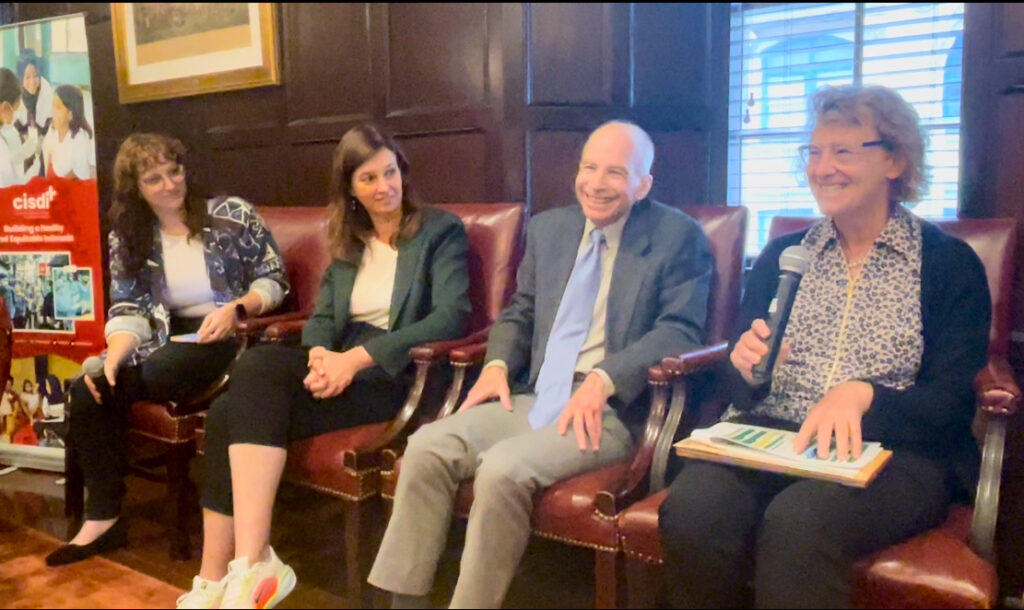September 26, 2024
Ministries of health, researchers, advocates, academics and civil society members came together on the sidelines of UNGA79 to discuss strategies for more meaningful and impactful engagement of civil society in global governance for health, climate, and other development sectors, particularly in the context of the Pandemic Accord negotiations at Center for Indonesia’s Strategic Development Initiatives’ (CISDI) event, Restrategizing Civil Society Engagement for Pandemic and Global Governance.
After two years of negotiations, countries did not reach an agreement around the Pandemic Accord and therefore agreed to continue negotiations for up to one year. The Pandemic Accord is meant to represent a global agreement on coordination, equity principles, financing expectations, and a range of capacity areas, including disease surveillance, healthcare workforce, lab facilities, and resources for non-pandemic related healthcare.

However, “there’s been no other process where they so systematically ignored civil society,” said Nina Schwalbe, CEO of Spark Street Advisors. AVAC’s Sam Rick who moderated the event reminded the audience that for pandemic prevention, preparedness and response (PPPR) to succeed, lessons from the HIV response must be integrated into the architecture being built for PPPR. Meaning, the principles of equity must be embedded into every level of these agreements, and governments and civil society must be empowered to hold them accountable.
Schwalbe and colleagues expressed their deep concern and dissatisfaction with the ongoing Pandemic Accord negotiations. See the recent statement from the Coalition of Advocates for Global Health and Pandemic Preparedness. “With decades of experience in the global HIV and NTD movements, we have demonstrated through our work the crucial role that civil society and communities play in advancing multilateral governance and their impact on health outcomes, as pandemics start and end with community and as such, communities and civil society must be at the center of, and included in all pandemic negotiations… We urge Member States to agree to a governance structure for the Accord moving forward that institutionalizes meaningful civil society and community engagement.”
The panel highlighted the disparities in vaccine distribution and the necessity for self-reliance in health systems. They emphasized the need for a unified message and strategic coordination among civil society organizations to influence global health policies effectively.
“You need global health, that is, you need the highest possible health outcomes for as many people around the world, and you need all of those benefits to be equitably distributed… And I think it’s up to us in civil society, pressing our governments, pressing the WHO, pressing the United Nations to actually make this happen.” – Lawrence Gostin, Faculty Director of the O’Neill Institute for National and Global Health Law
The panel made clear calls to action:
- Read and provide comments on the draft pandemic agreement text to identify gaps and push for stronger civil society participation.
- Engage with national authorities responsible for pandemic preparedness and response to ensure meaningful civil society participation at the country level.
- Support a unified message that can be widely endorsed by civil society organizations.
- Advocate for the establishment of formal, funded, and representative civil society engagement mechanisms in the pandemic agreement negotiations and other global health governance processes.
- Explore opportunities to leverage upcoming events like the COP meetings to amplify civil society voices and push for greater inclusion.
For More on Pandemic Accord Negotiations, Read:
- Pandemic Accord Priorities, Coalition of Advocates for Global Health and Pandemic Preparedness
- Advocates’ Guide for PPPR: Pandemic Prevention, Preparedness and Response in 2024, AVAC
- Fighting the Same Fight Again: Civil Society and Community Engagement in Global Health Initiatives, Samantha Rick (AVAC), Quentin Batreau (GFAN), Eolann MacFadden (Frontline AIDS)
- New Pandemic ‘Lite’ Agreement Shifts Key Decisions to Post-Negotiation Forum, Health Policy Watch